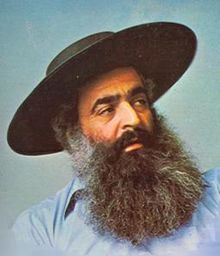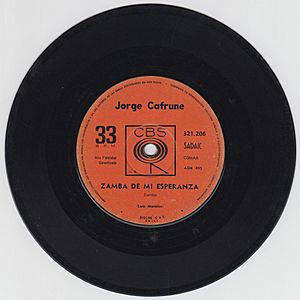Jorge Cafrune facts for kids
Quick facts for kids
Jorge Cafrune
|
|
|---|---|
 |
|
| Background information | |
| Birth name | Jorge Antonio Cafrune |
| Born | August 8, 1937 |
| Origin | Jujuy, Argentina |
| Died | February 1, 1978 (aged 40) |
| Genres | Argentine folk music |
| Occupation(s) | Singer, musician |
| Instruments | Vocals, guitar |
| Labels | Columbia, CBS |
Jorge Antonio Cafrune (born August 8, 1937, in Perico Del Carmen, Jujuy, Argentina – died February 1, 1978, in Buenos Aires) was a very popular Argentine folk singer. He was also a dedicated researcher who collected and shared the native culture of his country. He helped many people learn about traditional Argentine music and customs.
Contents
Early Life and Musical Journey
Jorge Cafrune was born on a large farm called "La Matilde" in El Sunchal, Perico Del Carmen, Jujuy. His family had roots in Syria and Lebanon. He went to high school in San Salvador de Jujuy, where he also took guitar lessons with a teacher named Nicolás Lamadrid.
In 1957, Jorge recorded his first music with a group called Las Voces de Huayra. This group later changed its name to Los Cantores del Alba in 1960. A famous musician named Ariel Ramírez was their manager.
Performing at Festivals
Starting in 1962, Cafrune became a regular performer at the famous Cosquín Folkloric Festival. This festival is a big event for folk music in Argentina. In 1966, while visiting smaller towns, he met a young folk singer named José Larralde.
Traveling for Music
In 1967, Jorge Cafrune started a special journey called "De caballo por mi patria" (By Horse Through My Homeland). This trip was a tribute to a historical figure named Chacho Peñaloza. During this journey, Cafrune traveled all over Argentina, just like many traditional Argentine cowboys (called gauchos) used to do. He shared his music and messages with people across the country. He wanted to connect with the people and their culture directly.
Music and Challenges
In 1977, after living in Spain for several years, Jorge Cafrune returned to Argentina. At that time, Argentina was under a military government led by Jorge Rafael Videla. This government was very strict and controlled what people could say or sing.
Singing for the People
The government saw some of Cafrune's songs as a challenge, especially his popular song Zamba de mi esperanza. This song had a strong message that some found politically sensitive. Even though the government did not want him to sing it, Jorge Cafrune was determined. He famously said, "Even if it's not on the approved list, if my people ask me to sing it, I will." He believed in singing for the people and their freedom of expression.
A Tragic Accident
Sadly, Jorge Cafrune died on February 1, 1978, at the age of 40. He was riding a horse on a main road late at night when he was hit by a van. He passed away about twelve hours later. His death was a great loss to Argentine folk music.
Film Appearances
Jorge Cafrune also appeared in several movies, often playing roles related to music and Argentine culture.
| Title | Year | Directed by |
|---|---|---|
| Cosquín, amor y folklore | 1965 | Delfor María Beccaglia |
| Ya tiene comisario el pueblo | 1965 | Enrique Carreras |
| El cantor enamorado | 1969 | Juan Antonio Serna |
| Argentinísima | 1972 | Fernando Ayala and Héctor Olivera |
| El canto cuenta su historia | 1976 | Fernando Ayala and Héctor Olivera |
See also
 In Spanish: Jorge Cafrune para niños
In Spanish: Jorge Cafrune para niños
 | Emma Amos |
 | Edward Mitchell Bannister |
 | Larry D. Alexander |
 | Ernie Barnes |


